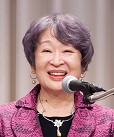Joy of Making Haiku
November 21, 2018
Ms. Kazuko Nishimura
Director, Association of Haiku Poets
Director, Haiku International Association
�� Haiku is a very short Japanese poem made up with 17 syllables of 5-7-5 patterns. It must contain a seasonal word which symbolizes or implies the season of the poem. Secrets of keeping ourselves young are expressed by words starting with the Japanese alphabets ��ka�� ��ki�� ��ku�� ��ke�� ��ko��: they are in English ��excitement��, ��curiosity��, ��ingenuity��, ��fitness�� and ��love��, which are all indispensable for making haiku.
Haiku is a very short Japanese poem made up with 17 syllables of 5-7-5 patterns. It must contain a seasonal word which symbolizes or implies the season of the poem. Secrets of keeping ourselves young are expressed by words starting with the Japanese alphabets ��ka�� ��ki�� ��ku�� ��ke�� ��ko��: they are in English ��excitement��, ��curiosity��, ��ingenuity��, ��fitness�� and ��love��, which are all indispensable for making haiku.
��If I ask you to make a haiku, you might hesitate saying that you are not talented in poetry or you are not familiar with haiku terms. However, the source of haiku is an excitement anyone can feel in their daily life. If you find something new, however small it may be, it can be the source of haiku. For example, on a cold morning when you notice that camellias start blooming or find your breath white, you feel the sensation that winter has come and be excited. Any small discoveries can inspire you to make a haiku.
��Next, it is curiosity. If you live each day full of curiosity, you are an ideal haiku poet. I invited a group of businessmen for ginko (haiku outing) to Kamakura. One of them found a fallen camellia blossom and tried to make haiku about it. He told me how his curiosity was enhanced by watching it very attentively. He was impressed to notice, for the first time, how 5 petals were firmly pasted around a yellow core and realized that is why camellia blossom petals never fall apart on the ground.
��Ingenuity or devising is also an essential element for making haiku as it is a fixed form of verse consisting of only 5-7-5 syllables and one season phrase must be included. You must exert ingenuity to choose the most suitable season phrase to make your haiku descriptive, for example cherry blossoms in spring or morning glory in early summer. With that season phrase as a hint, you can make one short poem while waiting for a bus, as it doesn��t take as long as writing a novel.
��Fitness or good health is needed, as we often go out on a ginko (haiku outing) to get many first-hand experiences. Though renowned haiku poet, Shiki Masaoka, was bed-ridden towards the end of his life, he left many marvelous haiku by keeping his mental health.
��Lastly love, but not necessarily love between male and female, rather a feeling of your heart fluttered. If you make haiku without your heart fluttered, it will be dull and boring. By keeping these ��ka��, ��ki��, ��ku��, ��ke��, ��ko�� in mind, I am sure you can stay young and be a good haiku poet.
��I have been hosting kukai (haiku session) every week for more than a half century. Pretending you are a different character, you write a haiku anonymously and criticize or comment on each other. At the end, your name is revealed and you read your haiku aloud. One of the big joys to participate in kukai is that you can become someone other than yourself. As a housewife and mother, I have never been called ��Kazuko-san��, but always called ��Mrs. Nishimura�� or ��Mother of so and so�� in my personal life. I regret now that I didn��t make a pseudonym. Members of my kukai are both male and female, young and old, some are students, others are lawyers or public prosecutors.
��There is a haiku column in major newspapers as well as economic papers and local papers, to which haiku poets contribute every week. I am a judge for Mainichi newspaper and select 12 out of about 1000 haiku sent each week. There are also 633 haiku private magazines. A TV program entitled ��prebato�� in which TV talents compete haiku every week is extremely popular.
��Haiku is now an international term and haiku is loved as a shortest poem throughout the world. About 120 members of Haiku International Association from 38 countries send us every month 3-line-poems in English. I am also a judge of ��HAIKU MASTERS�� of NHK World broadcasted in English in 140 countries.
��This summer I visited Sweden with members of Haiku International Association. After we exchanged with 157 members of Swedish Haiku Exchange Society, we went to Norway and visited Grieg��s House. A young female curator there who said she used to make haiku when she was a child asked me, ��What do you call haiku in Japanese?�� I was shocked and answered, ��haiku is a Japanese word.�� She asked me again, ��What does it mean?�� I am wondering how I should respond if I am asked the same question again by foreigners.
��There are many excellent cultures in Japan. Among them haiku is a culture in which you can become a creator, not just an admirer. When I hosted kukai in New York, they all exclaimed ��How dramatic!�� and ��How exciting!�� I received the same reaction in Paris when I hosted kukai in the Japan Culture Center and at the Japanese Language School. Taking this opportunity, I would like to propose making Rotary Kukai. If I can be of any help, I will be more than happy.